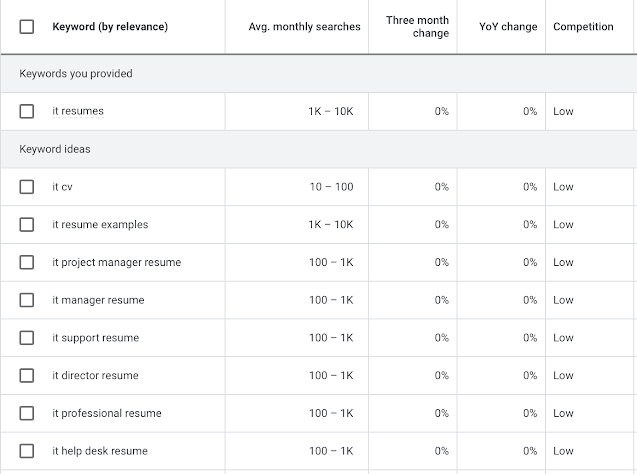While many resume writers are generalists, some of the most successful career industry professionals specialize in working with a specific niche of jobseekers: Women returning to the workplace, for example. Executives. IT professionals. New college graduates. Mid-level sales managers.
Not sure what you want to specialize in?
One way to find the right business niche is to conduct keyword research. Keywords are terms people enter into search engines to find information they need — which helps them solve their problems. Search engines like Google track this information and make it public. You can use this data to refund your niche ideas and discover which niches people are actively searching for.
Start With Your Passions and Interests
Start by brainstorming. What kinds of jobseekers do you like working with? What areas do you have experience in? (Some resume writers specialize in the field they came from — for example, Wendi Weiner works with attorneys.)
Once you have some ideas, you can use keyword research to narrow down and refine your niche.
Keep in mind — even if you specialize in a niche, you can still work with jobseekers from all backgrounds and levels of experience. (But having a niche will make it easier for you to be found by prospective clients.)
How to Find Keywords
There are many premium SEO software programs available, but most people find that Google’s free Keyword Planner tool is enough. The purpose of this tool is to help you assess keywords for Google ads, but we can use it for basic keyword research. There are also free alternatives available, like SEO Book and WordStream.
Enter into the tool some keywords related to what you do. You could use a simple phrase like “resumes for executives” or “IT resumes” and you’ll get a list of similar keywords that are related. Skim this list and look for other areas that might be interesting. For example, under “IT resumes,” you might niche even further to “IT project manager resumes.”
How to Assess Keywords
Look for a high volume of monthly searches. A good guideline is over 1,000 searches. This tells you that people are actively looking for this information.
The next step is to check out the competition. You’re looking for keywords that have high search volume and low competition. To assess competition, go off the tool and perform a simple Google search. Put the keyword in quotation marks so you can get the exact phrases. You’ll then see how many sites are targeting the same keyword.
Since you’re not doing actual SEO planning, you don’t need an exact assessment of these keywords. Lookout the sites that come up on the first few pages of the search results, and you can see whether other businesses are covering these niches.
Your niche doesn’t need to be completely uncharted territory – there are only about 4,000-5,000 professional resume writers worldwide, so if there are 15 resume writers who specialize in teacher resumes, there is PLENTY of work for everyone! But by looking at the competition, you may get ideas on how to set yourself apart.
When choosing the right niche for your career services business, you should consider objective data as much as possible to assess whether your niche is popular and profitable. Keyword research is one effective way to do this.



